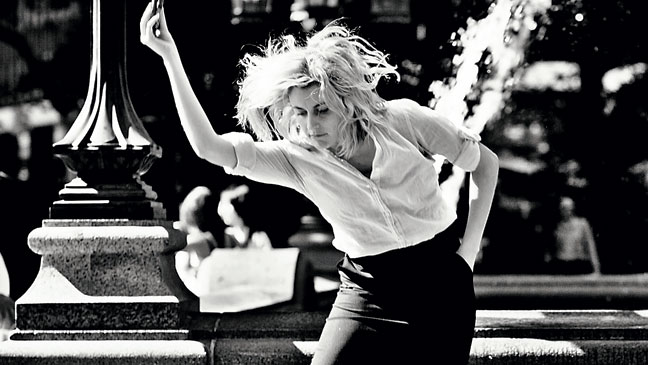Frances Ha runs a very long 84 minutes. It offers an obnoxiously self-satisfied portrait of a young white New Yorker–played by Greta Gerwig–running out her parent’s stipend, roommating with other New York hipsters, sometimes skipping the pond to Paris, all the time pursuing her goal to be a professional dancer, even though she demonstrates no aptitude for it.
You gotta love her, is writer-director Noah Baumbach’s biased position. Frances Ha is Baumbach’s love letter to Gerwig, his current paramour (she was the ingenue in his film Greenberg who replaces Jennifer Jason Leigh in the protagonist’s affections). Yet Baumbach is the one American filmmaker with the least aptitude for showing love on screen after William Friedkin—yet Friedkin has skills in the opposite direction. Once again aping the self-absorption made fashionable (though never popular) by the Mumblecore indie film movement of young hipsters, Baumbach’s title refers to Andrew Bujalski’s early Mumblecore release Funny Ha Ha. Baumbach uses Gerwig, that movement’s female icon, to express his own confusion of artistic-pursuit with social-climbing–which here comes off as ambivalent misogyny.
Probably because Baumbach never examines his own hatefulness, he expects others to view it affectionately. The embarrassing spectacle of Frances/Gerwig gracelessly trotting across dance studios, flopping on beds and peeing in the subway (she’s called “undatable” by a couple of dorks) is only comparable to grotesque females in Baumbach’s previous films. Frances/Gerwig’s “weird man-walk” might be intended to recall Cybill Shepherd’s gauche stomp in Daisy Miller, but Peter Bogdanovich made her sympathetic (as Whit Stillman miraculously did with Gerwig in Damsels in Distress). Here, Frances/Greta’s lunatic personality crosses the parvenus of Woody Allen’s Manhattan with the Left Bank jeunne filles of the French New Wave.
While Frances Ha looks spiffy (cinematographer Sam Levy imitates the Nouvelle Vague’s sunlit black & white fairly well), its gloss lacks the New Wave sense of discovery. Everything’s so derivative, from using street addresses as chapter titles to lifting Georges Delerue’s King of Hearts score, it merely matches Allen’s unoriginality. Check out Criterion’s new Blu-Ray version of Godard’s 1964 Band of Outsiders to see the style of b&w chic that Baumbach simultaneously aspires to and disgraces. Godard made then-wife Anna Karina the disarming center of a still-stylish triangle (with the irresistible Samy Frey and Claude Brasseur) and subjected them all to absolute moral scrutiny–whether racing through the Louvre, robbing a mansion or improvising an immortal Madison line dance in a bar. The DVD also includes Agnes Varda’s 1961 short Les Finaces de Pont Mac Donald in which Karina and Godard himself cavort in the style of a silent-era romantic comedy–the esprit Frances Ha absolutely lacks. But Baumbach can only celebrate proud hateful retorts and transparent privilege (Frances/Greta’s Paris trip becomes the same nowhere as Tokyo in Sofia Coppola’s Lost in Translati1on.)
Baumbach can hardly get an honest review in this town where his personal spider-web network of family/media connections guarantees indulgent endorsements; so his deficient poison pen letter gets praised as a cinematic valentine by confreres who share his warped values–the private life exploitation and payback of New York’s Manhattan-Brooklyn boho/bourgeoisie (same as with his detestable The Squid and the Whale). Private code is what Frances/Greta pines for when she describes a “secret world [shared with her best friend played by Mickey Sumner, daughter of musician Sting, another of Baumbach’s social-climbing hires], that’s what I want in life.” Maybe you have to be a Mumblehattan elite to love this kind of self-love.
Follow Armond White on Twitter at 3xchair

